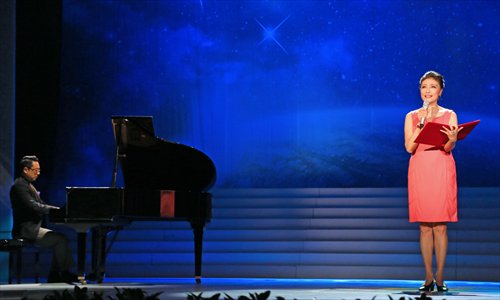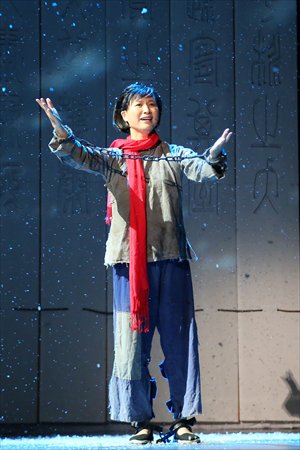ARTS / BOOKS
Dream & reality
Poetry festival celebrates the evolution of one of China’s oldest art forms

Poets take the stage to recite famous poems as part of the opening ceremony for the 4th China Poetry Festival on Tuesday. Photo: CFP

A performer takes the stage to recite famous poems as part of the opening ceremony for the 4th China Poetry Festival on Tuesday. Photo: CFP
It was the best of times, it was the worst of times.While Charles Dickens wrote this to help set the theme of his novel A Tale of Two Cities, it is also a fitting description of the contemporary poetry scene in China. While people still admire poets both past and present and numerous poetry festivals are held at various different levels by the government and poetry lovers across the country every year, the rise of fast-food-style cultural products such as reality shows, online videos and soap operas has caused poetry to become less important to society than it once used to be.
To battle this trend, poetry critics have appealed to poets to strive to create higher quality poetry that is strongly relevant to the lives of people today, while also calling for more creative freedom so that poetry can get the space it needs to continue to develop and evolve in today's modern era.
"No matter when they lived, all poets are the contemporary poets of their time," pointed out Xie Mian, a professor at Peking University (PKU) and president of PKU's China Poetry Research Institute, during the "Dream and Reality" seminar on Wednesday in Mianyang, Sichuan Province.
"The masterpieces of the past were able to become immortal because they represent the real voices of their times," Xie continued, pointing out the reason why such famous works such as Qu Yuan's (approx 340BC-278BC) Li Sao, Li Bai's (701-762) Bring in the Wine and Du Fu's (712-770) On Hearing Government Troops Recapture Henan and Hebei are still enjoyed even today.
Last week, Xie and dozens of other senior poets and critics came to Mianyang to attend the seminar, itself a part of the larger 4th China Poetry Festival, the only national-level poetry festival in China, co-hosted by the Ministry of Culture, the China Writers' Association and the People's Government of Mianyang.
Poetry for our times
Most of the participants attending the seminar agreed that poetry lovers and poets have showed enormous enthusiasm for the art through their writings and by organizing activities among poetry circles. "But the creative abilities of most poets are limited, and there are very few outstanding ones with great works," Xie said. "Many poets have great writing skills, but lack individuality, which makes everything sound quite the same."
People today still read poems by historical masters such as Li Bai because his unique style allows them to feel "the fragrance of the Tang Dynasty (618-907)."
"These poems give a real description and feeling of the Tang Dynasy's most prosperous age and so leave a deep impression on our minds," he added, saying that the future masterpieces of our times will be those poems that can capture the feeling of our own age.
In ancient times, poetry was inspired by things such as respect for life and nature, patriotism, and a desire to take care of people at the bottom of society. "The first two are personal experiences, while the last is a social responsibility. However, both of them are of equal importance," said Beijing Normal University's Zhang Qinghua, suggesting that poets need to care about human society to stay relevant. "A real poet must get involved in his times in some way. He can't just ignore suffering and the dark side of society."
Although Zhang admitted that the responsibilities of poets can sometimes be very abstract, there is one thing he is sure about: "They must be brave and sincere."
Freedom to create
While at a seminar in 2005, veteran poet Cai Qijiao was asked to summarize what he felt was the most valuable aspect of poetry in a few simple words. His answer was "freedom," an opinion also shared by poetry critic Wu Sijing, current editor-in-chief of poetry magazine Shitansuo (Poetry Exploration).
China's new poetry movement was born after the May Fourth Movement in 1919, an extremely influential movement that encouraged individuality and freedom of expression. Since then, great Chinese poets, from Yu Dafu to Ai Qing, have all praised this newly found spirit of freedom.
"Poems are the messenger of freedom… their sound is the sound of freedom, their smile is the smile of freedom," Ai Qing once wrote.
This love of freedom of thought and style has become especially apparent since the 1980s, as Chinese poetry has made great strides by abandoning traditional forms and embracing freedom. "Poets have been able to express their thoughts freely towards the outside world through their works," Xie explained. "Chinese poetry has made unprecedented progress over the last 30 years."
However, despite these advancements more freedom is needed. Wu is of the opinion that securing creative freedom for poets will help them create more quality poetry.
"Society should encourage poets to think freely, create and compete, instead of persecuting them for their creative and brave works," he said.
Age of the Internet
Wang Jiaxin, a professor at Renmin University of China, explained that China's fast economic development has led to a brand new age of consumption, not just of material goods, but of culture as well. During this new age, society will need poems that can meet its taste and be consumed in a manner similar to how Beijing's 798 Art Zone has "opened a door for people to consume fine arts."
"This is the dilemma brought about by cultural consumption. It has shrouded the criteria of what can be considered quality poetry and has lowered people's aesthetic standards. But we can't live outside this society, we have to keep a clear mind and understand it," Wang warned.
The China Writers' Association's Huo Junming is of the opinion that the biggest change for poetry has been the wide-spread use of the Internet and social media such as micro-blogs and WeChat. "The Internet can't overturn the development of Chinese poetry, it can only act as a new medium that makes the creation, publication and communication of poetry much easier and faster," said Huo.
However, he pointed out that this has also led to a change among younger poets who now show less respect when it comes to poetry than those before them. Additionally, it has caused poetry to become something like fast-food, where one-time poets and critics "overflow the Internet, which is not a sign that poetry is undergoing a renaissance like some young scholars claim."
Despite these current trends in poetry, everyone does agree that the art form is a critical part of modern society. "In such a fragmented world, we need poetry to unite our minds. In an age of mass entertainment, we need poetry to upgrade ourselves on a spiritual level and to encourage us to think deeply," Xie explained.

